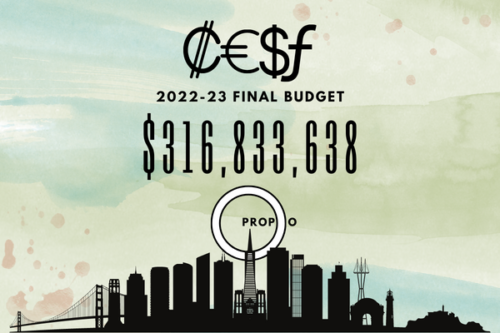Prop O was rejected, What’s Next?
By Onyx Hunter
onyxhunter@gmail.com
It’s no secret City College has lost more than few of its teeth under budget cuts and deficits over the past 6+ years.
Proposition O, a parcel tax designed to provide more funding to City College was not passed. What are we gonna do now?
There are a few options proposed by Rick Baum who gave alternatives during a debate on the topic “We need to be going after enrollment, or after the Democrats who run the state to cough up more money for public education.”

Rick Baum shared sentiments regarding the time scale of Proposition O “By the time the money arrives in two years it would probably only make-up for the downsizing of the past two-three years.”
Rick’s position was generally that Proposition O had issues like oddly specific fund allocations, a lack of any public or even school union input on the measure, a taxation of San Franciscans for mistakes that the board has made, and poorly written tax code.
Proposition O’s failure cannot be seen as a death knell for the College’s future. On the contrary it needs to be a wake up call.
Mayor Breed herself vetoed three million in emergency funding the College would have received to restore 300 classes cut by Chancellor Rocha in 2019. As a school and community we have to prove that this school is worth fighting for, because now that Proposition O has been slashed we can create a more open and succinct plan of action to reinvigorate the College.
Students must be informed of the College’s status and the teachers of the college who are informed of its processes should get students involved.
The newest generation of students coming to City College are some of the most politically active and aware, the midterm elections lack of red wave is accredited to young voters by many people. The only people who can solve this situation is the new mass of young voters who go to City College.
We have two years to show that we don’t need emergency funding from Proposition O, we need higher enrollment, and to get there we have to involve the High Schools more heavily. We need simple instructions and a simple user interface to get there.
All it takes is one Youtube video and Computer Lab to get people started.

Is there any reason why my reply has not been posted. Here is what I sent you yesterday with a couple of minor changes–I prefer you use it.
_________________________________________
The defeat of the parcel tax, Prop O, was a major blow against the college given the support for its passage coming from union leaders at the college, the administration, and the board of trustees. It received just 36.67% favorable votes.
In recent elections, measures benefitting the college have received widespread support. The March 2020 $845 million bond measure for the college passed with support of 72.39% of the voters. The Prop A regressive* parcel tax in 2012 and its later renewal each received support from more than 70% of the voters. The defeat of Prop O represents an unbelievable decline in support—well over 30%.
Rather than take any responsibility, the blame for the devastating defeat is largely being placed by AFT 2121’s president on “corporate opposition that spent more than $1 million to defeat us,” an obvious problem, but normally offset by what she described as a campaign consisting of faculty “students, classified staff, and community allies” who produced “one of the largest grassroots campaigns in the city” that “gathered over 20,000 signatures, hand delivered literature to over 150,000 homes, [and] called over 40,000 voters.”
There is no acknowledgment that Prop O had numerous flaws. To read more about it and how it could have been a better measure, go to the CCSFHEAT.org website and scroll down and click What’s wrong with the CCSF Parcel Tax Initiative. Be sure to read the endnotes.
I teach American Government at CCSF. I was not interviewed for this comment.
*As a result of the passage of Prop A, homeowners and the owner of the Bank of America building each paid $79/year in additional property taxes.
link for “devastating defeat” if it does not work: https://www.aft2121.org/2022/11/election-update-a-partial-win-for-city-college-a-testament-to-the-power-of-our-solidarity/
CCSF Heat Article on Prop O https://drive.google.com/file/d/143rJV_ylQblMiq_lGD29cFV0rKFYna_K/view
The defeat of the parcel tax, Prop O, was a major blow against the college given the support for its passage coming from union leaders at the college, the administration, and the board of trustees. It received just 36.67% favorable votes.
In recent elections, measures benefitting the college have received widespread support. The March 2020 $845 million bond measure for the college passed with support of 72.39% of the voters. The Prop A regressive* parcel tax in 2012 and its later renewal each received support from more than 70% of the voters. The defeat of Prop O represents an unbelievable decline in support—well over 30%.
Rather than take any responsibility, the blame for the devastating defeat is largely being placed by AFT 2121’s president on “corporate opposition that spent more than $1 million to defeat us,” an obvious problem, but normally offset by what she described as a campaign consisting of faculty “students, classified staff, and community allies” who produced “one of the largest grassroots campaigns in the city” that “gathered over 20,000 signatures, hand delivered literature to over 150,000 homes, [and] called over 40,000 voters.”
There is no acknowledgment that Prop O had numerous flaws. To read more about it and how it could have been a better measure, go to the CCSFHEAT.org website and scroll down and click What’s wrong with the CCSF Parcel Tax Initiative. Be sure to read the endnotes.
I teach American Government at CCSF. I was not interviewed for this article.
*As a result of the passage of Prop A, homeowners and the owner of the Bank of America building each paid $79/year in additional property taxes.
AFT 2121 president statement can be found at https://www.aft2121.org/2022/11/election-update-a-partial-win-for-city-college-a-testament-to-the-power-of-our-solidarity/